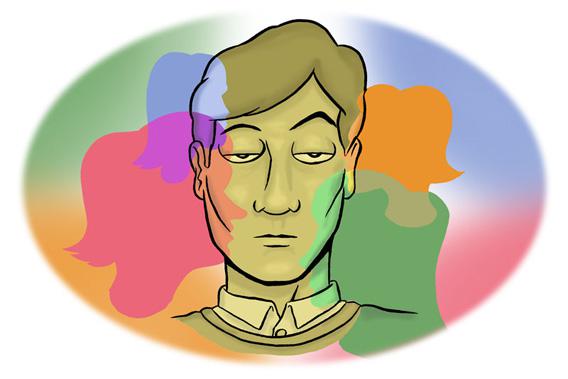Also in Slate, Katie Roiphe explains how Adelle Waldman perfectly captures the archetype of sensitive literary man.
When we first meet the hero (or maybe antihero, depending on your perspective) of Adelle Waldman’s provocative debut novel, The Love Affairs of Nathaniel P., he’s in a bit of an awkward situation. Nate has just run into a former flame—Juliet, a woman whom he got pregnant, accompanied to the abortion clinic (chivalrously paying for the procedure), comforted for the remainder of the day, and then summarily abandoned—near the waterfront in Greenpoint, Brooklyn. Juliet bristles at the sight of him and begins a reprimand: “You could have at least—oh, never mind.” Nate wonders, “Could have at least what?”
Waldman spends the remainder of The Love Affairs of Nathaniel P. inviting us to complete Juliet’s truncated sentence. What could Nate have done to behave more honorably toward Juliet, whom he just didn’t like all that much? What could Nate do to behave more honorably toward all the women he dates?
Nate isn’t some ignorant clod; he’s “in possession of a functional and frankly rather clamorous conscience” and an impressive intellect that he’s put to use writing criticism and a soon-to-be-published novel. We get a sense of Nate’s worldview later in the first chapter, at a dinner party full of other thirtysomething professionals, where he discusses his plans for an essay on how privileged people “outsource the act of exploitation”—benefit from economic inequality while maintaining enough distance from it that they never have to confront their own complicity in it. He explains,
“You know how you read a Dickens novel where these eight-year-old boys work in factories or beg on the streets? And you wonder why didn’t anyone give a fuck? Well, we aren’t so different. We’ve just gotten better at hiding it—from ourselves most of all. People back then at least justified their behavior by admitting to their contempt for the poor.”
Nate, Waldman’s novel suggests, is one of the morally squeamish elites he derides—and in more ways than one. Nate is at least conscious of his economic hypocrisy, but he is for the most part blissfully ignorant of his sexual hypocrisy. He sees the way he benefits from contemporary capitalism, understands how it hurts other people, and feels bad about it. But he has far less clarity when it comes to his personal life—he benefits from contemporary sexual mores, but he hates thinking about how they hurt other people (especially the women he sleeps with). Men used to justify their behavior by admitting to their contempt of women; what’s Nate’s justification?

Photo courtesy of Lou Rouse
Judging from much of the novel’s advance press, publisher Henry Holt is making two related assumptions about Nathaniel’s appeal. The first is that the most interesting thing about the novel is that its author is a woman but its protagonist is a man. Waldman “succeeds in crossing the gender line, imagining the world from behind the eyes of a male character both sympathetically and unsentimentally,” reads one of the blurbs on the back of the book; or, if you prefer, Cosmopolitan has it that the book is “written from a dude’s POV.” The second is that the primary audience for Nathaniel P. is women. (Perhaps Holt is resigned to the stereotype that men don’t buy books written by women.) “It’ll have you screaming because you have so dated this guy,” raves Glamour rather presumptuously; another novelist calls it “a laugh-out-loud treatise on why he didn’t call.”
Both of these assumptions are wrong. The gender discrepancy between Nathaniel P.’s author and its protagonist is perhaps the seventh or eighth most interesting thing about the novel, and Waldman seems to be making no bets about the perspective or prejudices of her audience. She holds her cards rather close to her chest, actually. Nate and his various girlfriends—most notably Hannah, the “nice and smart” fellow writer whose five-month relationship with Nate the novel spans—are alternately likeable and baffling, sympathetic and infuriating. It would be just as easy to come away from the novel disillusioned with women as disillusioned with men—but if you do either, you’re missing the point. Unlike Nate, Waldman is smart enough to avoid making generalizations about either sex. The main target of her gimlet eye is not men; it is the very narrow population among whom Nate (and Waldman) (and I) reside: economically privileged, liberal-minded, well-educated, mostly white writers and editors living in gentrifying Brooklyn.
It is Waldman’s exquisitely detailed depiction of this very specific demographic, not her depiction of the other gender, that makes The Love Affairs of Nathaniel P. a discomfitingly thrilling read. Waldman’s characters picnic in Prospect Park, coo when they spy kale on a restaurant menu, parse the difference between racism and racialism, and complain about the unreliability of the G train. For readers belonging to this sliver of New York, she nails it. (Readers who do not belong to this sliver of New York will probably enjoy the schadenfreude of reading about the unhappiness endemic to said sliver.)
As Waldman points out, we of that demographic are quite a bit less progressive and enlightened in our personal lives than we might like to think. Nate, a former straight-A student at a Jewish day school and a Harvard grad, seems to get involved with two kinds of women. On one side are the pragmatic, competent, reasonable women, like his college girlfriend Kristen, a pre-med do-gooder; Juliet, the briefly pregnant business journalist; and Hannah, the interesting but not conventionally beautiful writer. On the other side are the beautiful, emotionally volatile, intellectually shallow women, like Elisa, the childish assistant to the editor-in-chief of a New Yorker-esque magazine, and Greer, the flirtatious memoirist whom one of Nate’s friends derides for “her willingness to trade on her sexuality and call it feminism.”
Nate is painfully conscious of how the women he dates reflect on his social status. “In theory, Nate disdained bourgeois status signifiers,’’ Waldman writes, “but in practice he took pride in Elisa’s whiff of smart chic.” Before he asks not-so-chic Hannah out, he considers that his piggish friend Jason would rate her a seven; after he’s been dating Hannah for a while, it worries him that another male friend, one whose girlfriend is stunning, might feel sorry for Nate.
Nate is even more painfully conscious that judging women’s worth by their conventional beauty is both intellectually and morally indefensible. His life philosophy is squarely egalitarian, and he wants to be the kind of man who is attracted to a woman’s intellect and character—and he resolutely admires Hannah’s intellect and character. This experience is new to him—compared to the other women he’s dates, he finds Hannah “so … reasonable, so not ridiculous.” So he represses his shallowness, pushes it down until it erupts in snits, uncomfortable silences, an edge in his voice when he’s talking to Hannah. “At moments Hannah seemed to trigger something sadistic in him,” he acknowledges to himself with confusion. “He could swear he didn’t want to hurt her, but sometimes, when she looked at him in a certain way, or that eager note crept into her voice, a perverse obstinacy rose within him.”
Ironically, Nate does the most harm in his attempts to quash his base instincts, his politically incorrect desires. There’s a horrifying and hilarious scene in which he notices that Hannah’s triceps are a little bit flabby and that her jeans accentuate her ass in an unflattering way, and he’s repulsed and transfixed—but then he chastises himself for sounding “like some sick fetishist of female emaciation.” He cannot abide the idea that his fading attraction for Hannah might not be logical, that perhaps his dick is not beholden to the same progressive ideals his brain is. So he strings Hannah along, continuing to attempt to justify his feelings with rationality and a perverse sense of justice. (Hannah, for her part, is so terrified of appearing clingy that she affects a less-than-convincing nonchalance.)
The Love Affairs of Nathaniel P. is less about what happens when our genitalia bump up against each other as what happens when our genitalia bump up against our ideology. In Nate and Hannah’s social sphere, it is considered bad for men to be stereotypically masculine (i.e., shallow and selfish), and it’s considered bad for women to be stereotypically feminine (i.e., needy and emotional): All feelings and impulses must be intellectually justifiable. This is not true only of Nate and Hannah, who suppress the parts of their personalities they don’t like; Nate has two polar-opposite friends, the male chauvinist Jason and the stridently pro-woman Aurit, who go to great lengths to concoct theoretical grounds for the way they treat the opposite sex. It might be better, Waldman suggests, if we let our hearts want what they want and put aside the liberal ideals and analytical rigor when we’re dating.
It would not surprise Nate that I drew a lesson from the novel about his love life. After all, he thinks “that women as a general category seemed less capable of (or interested in) the disinterested aesthetic appraisal of literature or art: they were more likely to base judgments on a thing’s message, whether or not it was one they approved of.” (Like many of Nate’s condescending generalizations about women, this one hit close to home.) He makes this observation during the course of worrying “whether he was a bit misogynistic.” He is—and if he were to accept that fact instead of suppressing it, he might actually start treating women a little bit better.
—
The Love Affairs of Nathaniel P. by Adelle Waldman. Henry Holt.
See all the pieces in this month’s Slate Book Review.
Sign up for the Slate Book Review monthly newsletter.
